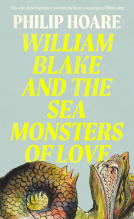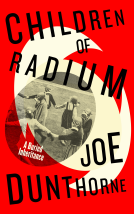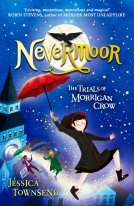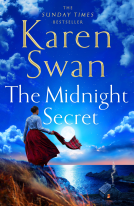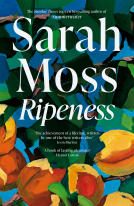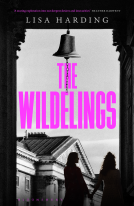
Reservoir 13
WINNER OF THE 2017 COSTA NOVEL AWARD
by Jon McGregor
This title was previously available on NetGalley and is now archived.
Send NetGalley books directly to your Kindle or Kindle app
1
To read on a Kindle or Kindle app, please add kindle@netgalley.com as an approved email address to receive files in your Amazon account. Click here for step-by-step instructions.
2
Also find your Kindle email address within your Amazon account, and enter it here.
Pub Date 6 Apr 2017 | Archive Date 31 May 2018
HarperCollins UK, 4th Estate | Fourth Estate
Description
WINNER OF THE 2017 COSTA NOVEL AWARD
A GUARDIAN BOOK OF THE YEAR
AN FT BOOK OF THE YEAR
A TLS BOOK OF THE YEAR
A TELEGRAPH BOOK OF THE YEAR
From the award-winning author of If Nobody Speaks of Remarkable Things. Reservoir 13 tells the story of many lives haunted by one family's loss.
Midwinter in the early years of this century. A teenage girl on holiday has gone missing in the hills at the heart of England. The villagers are called up to join the search, fanning out across the moors as the police set up roadblocks and a crowd of news reporters descends on their usually quiet home.
Meanwhile, there is work that must still be done: cows milked, fences repaired, stone cut, pints poured, beds made, sermons written, a pantomime rehearsed.
The search for the missing girl goes on, but so does everyday life. As it must.
An extraordinary novel of cumulative power and grace, Reservoir 13 explores the rhythms of the natural world and the repeated human gift for violence, unfolding over thirteen years as the aftershocks of a stranger’s tragedy refuse to subside.
WINNER OF THE 2017 COSTA NOVEL AWARD
LONGLISTED FOR THE MAN BOOKER PRIZE
SHORTLISTED FOR THE GOLDSMITHS PRIZE
‘A rare and dazzling feat of art’ George Saunders, author of Lincoln in the Bardo
‘McGregor writes with such grace and precision, with love even, about who and where we are, that he leaves behind all other writers of his generation’ Sarah Hall, author of The Wolf Border
‘Reservoir 13 is quite extraordinary – the way it’s structured, the way it rolls, the skill with which Jon McGregor lets the characters breathe and age’ Roddy Doyle, author of Paddy Clarke Ha Ha Ha
Available Editions
| EDITION | Ebook |
| ISBN | 9780008204877 |
| PRICE | £5.99 (GBP) |
| PAGES | 336 |
Featured Reviews
 Sue B, Reviewer
Sue B, Reviewer
This is a powerfully seductive book. Characters and relationships come and go, some violently, some gradually, but there is a relentless rhythm to the life of the village. I came to look forward to the seasons coming round - farmers’ routines, harvesting crops and rearing livestock, work on the allotments, wild animals’ lifecycles - judicious repetition of phrases every year was particularly effective at reeling me in. By the end of the book, I was ready to move to the Peak District myself, I’d feel at home there with characters I’d come to care for. A realistic and unsentimental depiction of life as it is lived, superbly well written - I’d recommend highly.
I've read a couple of Jon McGregor's novels before, one I loved and one I couldn't get beyond the first few pages. This has restored my faith in his considerable talent. With thanks to 4th Estate/NetGalley for the opportunity to read and review this.
 Susan R, Reviewer
Susan R, Reviewer
I have never read anything by Jon McGregor before, but had heard good things about his books and was interested to read his latest. It begins with the disappearance of a thirteen year old girl, who was staying in the village with her parents. The police and emergency services arrive, along with the media, and the small community reacts in difference ways. As helicopters search, a local farmer has to collect his panicked flock; others organise search parties and the local vicar attempts to bring solace to the parents of the girl and her congregation.
At first, locals are unsure what to do. Celebrations are cancelled, a group of teenagers know more than they will admit and comments are made by locals, which suggest they are not the only ones… Still, despite the subject matter, this is not a crime novel. It is literary fiction, wrapped around a possible crime, and showing how events affect the local community. For time passes and gradually Rebecca Shaw – or Becky, or Bex – remains in the collective thoughts of those who live in the village, but she remains a distant presence. Those who live in the village dream of rescuing her, or finding or, while others are sure they have seen her. Yet, she remains missing and life goes on.
As the reader, we witness the village though the years following this event. There are births, love affairs, separations, suspicions, domestic abuse and friendships. Businesses fail or flourish, farmers tend their animals and their land. Some move away from the village, while newcomers arrive. Although written with great understatement, this is oddly poignant and moving. The seasons come and go and life goes on, while Becky remains a missing poster, her fate hanging over the village like a looming shadow. I loved McGregor’s writing style and I would certainly read more by him, but I did somehow finish this just wanting a little more. Still, despite the calm pace of the novel, I really could not stop reading this and think the author really captured the feelings of the villager’s inhabitants extremely well.
 Melissa M, Book Trade Professional
Melissa M, Book Trade Professional
Startlingly refreshing, with an amazing sense of time passing - you become tuned to the seasons passing, and the stories of the entire village become as known to you as those of your own personal community. The strands that weave through from the missing girl linger for generations.
 Kate W, Educator
Kate W, Educator
Previously, I have read and loved McGregor's short stories, but this is the first novel I've tried. I found it very difficult to put down despite its measured pace, and I will definitely seek out his other books. The novel gradually builds a picture of a fully realised group of people, and it has the richest sense of place I can remember.
 Lucy D, Librarian
Lucy D, Librarian
What a beautifully written book. The descriptions of nature were exquisite and the steady, relentless passage of time was captured extraordinarily well. Would have loved to find out what happened to Rebecca though!
'Reservoir 13' blew me away. It was haunting, tense, and uncomfortable but hypnotically written. It was an evocative description of rural life and relationships. I would definitely recommend this book.
 Jackie M, Book Trade Professional
Jackie M, Book Trade Professional
Beautifully written, like a perfect combination of Undermilkwood and the Archers, like being a fly on the wall observing village life - reading this book you become a part of the village, not just a reader. Loved it from page 1.
 Kate D, Media/Journalist
Kate D, Media/Journalist
To be published in numerous magazines in August: A teenage girl goes missing while on holiday in an English village. Seasons come and go and life goes on, but the girl’s mysterious disappearance continues to affect village life. Some people dream of finding her alive, others of discovering her body. This is not a crime novel, more a glimpse into human nature. There are a lot of characters, and you get to know each one as they go about their daily lives. It’s a quiet book, but it certainly draws you in.
 Sandra D, Reviewer
Sandra D, Reviewer
‘Reservoir 13’ by Jon McGregor is a thoughtful, intelligent telling of what happens to a village when a person goes missing. Told after the event, it brings a new angle of understanding to the post-event trauma of those on the outer circles of tragedy.
A girl goes missing in a village surrounded by moors, caves and reservoirs. ‘The girl’s name was Rebecca, or Becky, or Bex.’ At no point do we hear the viewpoint of the girl, her parents, or the investigating police. Slowly the story unfolds as we are told the life of the village through the years after it happened by an omniscient narrator, disconnected from the action.
I loved the way McGregor recounts the daily comings and goings of the village, the farmers, the vicar, the schoolchildren. The rhythm of life and nature is mesmeric, the message is ‘life goes on’. Love affairs start and end, babies are born as are lots of sheep, cows are milked, allotments tended. The village sits within the natural world of peaks, woods and rivers and, sometimes only in a single sentence, we are told of the hatching of butterflies, the unfurling of new leaves, the water running beneath the bridge. The writing style is sparse and all the more beautiful for that. The action switches from one person’s life to the next, sometimes in a simple factual sentence such as ‘this happened’. But as the action moves from one local to another, the story is slowly, painstakingly pieced together of a village which struggles to leave behind the mystery of what happened to Rebecca/Becky/Bex.
At the beginning I was unsure how the story would unfold: murder, missing person, runaway teenager, abduction? It is this not knowing which casts a shadow over everyone in the village.
Read more of my book reviews at http://www.sandradanby.com/book-reviews-a-z/
I've never read any of Jon McGregor's work before, but I'm glad I stumbled upon this one. He has the special talent of telling a story as an omniscient narrator, without much dialogue, but full of description and beauty. I call it a special talent because, when done wrong, it goes very wrong indeed, but McGregor is an expert at it. Reservoir 13 is a gripping, haunting novel.
 Mandy J, Reviewer
Mandy J, Reviewer
I found this a remarkable book, haunting, almost mesmeric, and totally compelling. Ostensibly it’s about a missing girl, who disappears when out walking with her parents. Immediately a search party assembles, and we’ve all seen such search efforts; police, helicopters, concerned members of the public. But nothing is found and eventually the search has to be called off. The whole village has been affected – but life has to go on. For how long, in reality, can you continue to care? And yet the girl is never completely forgotten. Her disappearance has changed the village in some fundamental way. Over the next 13 years we follow the community as the seasons come and go, nature’s inexorable progress through the year repeats and repeats, and life does indeed go on. There’s little drama here, and no plot. In an understated and detached tone, almost with a sort of aerial view as the author seems to hover overhead merely observing rather than commenting or explaining, we simply watch what happens to everyone. Each of the 13 chapters covers a full calendar year, and 12 of them start with the same words. We get to meet many of the inhabitants, get close to some more than others, feel we “know” some more than others, and we care about some more than others. Just as in our own lives and communities. It’s a rather gloomy downbeat view of life but I found it both convincing and deeply moving.
 Sonia F, Reviewer
Sonia F, Reviewer
Such a unique and evocative book.
No plot as such, this is more like the stream of consciousness of a village over the course of 13 years.
It starts when a teenage girl goes missing, but don't expect a murder mystery or thriller of any kind, it very much isn't. It addresses how her disappearance touches, or doesn't even touch everybody in a Midlands village in the UK.
The seasons change, villagers get older, develop relationships, come and go. Nature and wildlife and the upping and downing of the water level of the reservoir come into play.
The prose is beautiful and quite captivating, the lives of the people of the village compelling - I felt carried along and wanted to travel the road even though there obviously wasn't actually a destination.
I loved this, but I do love the unusual - I can tell it wouldn't be for everyone, but the characters spoke to me, and I wanted to listen!
Wow.. I read Jon McGregor's book 'If Nobody Speaks of Remarkable Things' a year or so ago and I loved it. Reservoir 13 is even better. A young girl goes missing on the moors above a small village and the book takes you through the following years through the viewpoints of inhabitants of the village and the ways in which their lives change. What is really striking about the book is the beautiful and lyrical use of language. It captures the changes of the seasons and thought and feelings of the villagers superbly. You really get the sense of being there, seeing the fox cubs play, the bats fly, hearing the intimate conversations of the characters and feeling the warmth and cold of the changing year. I don't think I'm doing the book justice but I'm struggling to find the words. Do they find the girl? You will have to read the book to find out.
Many thanks to the publisher and NetGalley for providing me with a complimentary copy of such a wonderful book.
 alison n, Reviewer
alison n, Reviewer
What an unusual book. I wasn't sure at first. A tale of a small village and its comings and goings told in a most unusual way. Information in sentences rather than paragraphs which can be disconcerting and there were times when I forgot who people were, but a thoroughly enjoyable read that is hard to describe
 Ruth N, Librarian
Ruth N, Librarian
This is less about the crime, and more about the reading experience. If you're going to find that annoying then you probably shouldn't read it!
It's an extremely ambitious story, taking place in one village over 13 years and, somehow, dealing with a multitude of characters...what feels like the whole village in fact! The seasons come and go, changing quickly through each chapter, and the various characters come in and out, giving birth, dying, falling out, breaking up, leaving the village, and returning. And around them all is the spectre of the missing girl, Rebecca or Becky or Bex. I felt overwhelmed, initially - there were too many people to deal with and who was he talking about now? And what was going on? And are they a suspect? And will we ever uncover the truth? After a while, the rhythm and flow of the story settled me, and I allowed myself to be carried along by the beautiful language, and the very cleverly crafted characters. It's a little like listening to the Archers, or watching a soap...you get glimpses of people, some of whom you like, some you don't, and then just as soon as things are getting interesting we're off onto the next person!
I've read books by McGregor before & I've enjoyed them very much as they're always very lyrical and beautiful to read. This one took a little longer for me to settle into, but once I did, I liked it very much.
 Steven P, Reviewer
Steven P, Reviewer
This is stunning . The seemingly glacial pace allows the writer to examine a town and what happens to it and its people.
The plot is strong but the development emotionally of the characters is stronger , this is a phenomenal novel that sees the quiet desperation of English lives and shows it to the world.
Recommended without reservation
 Leslie G, Book Trade Professional
Leslie G, Book Trade Professional
it all begins in a kind of breathless style but we read closely because maybe we will see clues to the missing girl in the kind of Under Milkwood scouring of the loves and betrayals and underworld of this place. the girl is 13 when she disappears - no trace ever, but, like the town and her father, we keep reading closely. i was amazed at the adeptness of the writer in sustaining this level of close observance and also making us care that the teens go drinking and hiding when they shouldn't, or that the vicar - a lady called Jane - continues to try to bolster the community as the waves of reaction spread through the community - even when we learn that the local boilerman at the school never lets anyone into the room - we are suspicious - nothing comes of it - or so we think - but our attentions are keyed up - really superb craftsmanship and we learn to care for the town focused on this event that is looked into fervently.
 Mary + Gerry M, Reviewer
Mary + Gerry M, Reviewer
Rebecca Shaw, on a New Year holiday with her parents, goes out walking on the moors one day, and disappears. The locals gather to help the police search the area, and at first the talk is of a twisted ankle, or the girl deliberately staying out, trying to frighten her parents, and expectations are high that she'll soon be found. But there are so many things that could have happened - she could have fallen into a quarry, be trapped down an abandoned mine, sucked into one of the bogs on the moor, or even hitched a lift to the nearest city, - and as the days, weeks, months pass, finding her seems unlikely. Despite their initial shock and concern, the villagers soon find that life continues, at first slowly but speeding up with the passing of the years - Spring comes with lambs and fox cubs, wild flowers blossom in the hedgerows, vegetables sprout up at the allotments; babies are born, children grow, relationships develop or falter, the elderly die, newcomers arrive, and ultimately people begin to forget about a missing girl.
I usually try to avoid spoilers when writing reviews but I don't think that's possible here because a lot of my thoughts revolve around what the book IS, and what it ISN'T.
Although the book opens with Rebecca's disappearance, it ISN'T a crime thriller, with clues to unearth, false leads to pursue, but ultimately leading to a resolution. Over the years, various times of Rebecca's clothing are found but no real evidence of what happened or clue to her whereabouts discovered. Instead the focus is on the impact to the people living in this quiet out-of-the-way village - something devastating has happened on their doorstep, but to an outsider that most of them had never met. Naturally they're shocked, but for how long can they be expected to grieve and put their lives on hold?
Personally I found a lot of similarities with McGregor's first novel, If Nobody Speaks of Remarkable Things. In much the same way, it encourages the reader to see and remark upon the small happenings that occur from day to day around us but which are so often missed in the rush of life; to stop for a while and watch a butterfly, listen to birdsong, or notice our children growing from infants to teenagers. It's a mesmerising, beautifully written book charting the emotional and physical changes within a small tightly-knit community over thirteen years, but this time I was left wanting something more. As the years pass, snippets of information come to light about Rebecca's disappearance, various items of her clothing are found on the moors, but no explanation of her disappearance is forthcoming. This may, in all honesty, be truer to life than a crime novel which neatly closes all leads off by the final page, and reaches some nature of resolution, even if not a happy one, but, even so, I was left unsatisfied. Somewhere I read that the mark of a literary novel is that it ends without resolution - this is certainly literary, not crime, fiction.
 Denise P, Reviewer
Denise P, Reviewer
I remember being blown away by Jon McGregor's debut novel If Nobody Speaks of Remarkable Things a few years ago and have gone on to read all his books since then. I know that his understated, lyrical style isn't everyone's cup of tea but I love it.
Reservoir 13 tells the story of a group of people who live in a small village in northern England over a period of just over 10 years. At the start of the book a 13 year old girl called Becky goes missing while she and her parents are staying at a holiday cottage in the area, and McGregor goes on to observe the locals' reactions to the event and its aftermath, as life inevitably returns to something like normal for everyone but the girl's parents who are often seen wandering forlornly around the village.
The characters and their everyday lives are beautifully described (I particularly enjoyed reading about Richard and Cathy's poignant mid-life relationship) and nature also has a large role to play in the storyline with the passing years since Becky's disappearance marked with the birth of animals and migration of birds.
The mystery of Becky's disappearance isn't tied up neatly at the end, although a few seeds are planted. The writing has an almost 'stream of consciousness' style as McGregor tells several stories on the same page (sometimes in the same paragraph) and I loved the hypnotically beautiful style and the depiction of everyday life continuing in the face of tragedy. A very absorbing and poignant read.
I took a while to get into this book because Jon McGregor's writing is unique but once I got used to it I found it captivating. Reservoir 13 isn't a thriller though it begins with a missing child. It's about the community in the village where she was staying when she disappeared. It's about time and the seasons and how things change in everybody's lives.
Thanks to Netgalley for my copy.
Every now and then a book comes along that is written in a style unlike any other. This is one of those books. Reservoir 13 is intimate, conversational, gossipy, nosy, and reads at times like a soap opera, at times like a country music song with a story to tell. Neither of those last two descriptions accurately convey its brilliance though. While seemingly detached, the style gets right under the skin. Sometimes it seems too much and one wishes for a break into direct speech or action, but it goes relentlessly on, poking its nose into other people's business.
A young teenager goes missing in the hills around Reservoir 13. The girl was last seen out walking with her parents but became separated from them. Naturally, the parents are suspected but there are others in the village with secrets to keep and information to hide. The girl's friends have not revealed all they could have done about the relationships between them. There are those in the village who have dark interests in young persons. There are philanderers and secret lovers and those who never manage to connect. There are marriages, divorces and violence. There are births and deaths and illnesses - indeed, all life is here. And underlying it all is the girl who disappeared.
Weeks, months and ultimately years go by and the girl is still missing. This is the story of how such an event impacts on a community, how they deal with it, respond to it and incorporate it into their reality.
Truly unique and a fascinating read.
Reservoir 13 opens with a teenage girl going missing in the hills close to a small English village. This is, however., not a crime novel. The girl's disappearance is the background to a vivid description of the village and the life within it - both human, and otherwise. The disappearance impacts on the village in different ways, both major and subtle, and the natural year turns and turns again. Small clues appear as time goes on, but, although the missing girl is always in our consciousness, other people and relationships come to the fore as time passes. Jon McGregor's writing is simple and beautiful and he writes as well about nature as he does about the small things that can form or break a relationship between people.
 Janet H, Reviewer
Janet H, Reviewer
A thirteen-year look at the life of the residents of a Peak District village, with the whereabouts of the missing girl haunting everybody. Short, precise sentences gallop through the months of each year, yet create an impressive picture of the area and its folk, their lives and loves.
A very enjoyable read
 Victoria F, Reviewer
Victoria F, Reviewer
"The missing girl's name was Rebecca Shaw. When last seen she'd been wearing a white hooded top."
This was such an unexpected but interesting little book. That sounds really patronising but I don't mean it to. With a missing girl story line I thought the plot line of Reservoir 13 would focus on the police investigation, but instead author Jon McGregor looks at how this event effects the community of the village she went missing in. It's not really like anything I've read before. It's about ordinary people and everyday life, yet it celebrates the beauty of the mundane.
As I said before, Reservoir 13 is not really a crime novel; if you're expecting a thorough mystery with a satisfying ending then this is not for you. To be honest, that was what I was expecting and when I first realised this was not what Reservoir 13 was, I couldn't get on with it, especially as the prose moves so fast. But once I settled in I really loved it.
I've never read any other Jon McGregor before so I don't know if this is how he usually writes, but his prose was fast and almost skips from character to character, never staying on one story-line for too long. At first this was quite disorientating, however, once I got used to the pace I actually enjoyed it. You'd think he wouldn't be able to impart knowledge or build a character when writing with such fast prose, but he is brilliant at making a character come to life with only the smallest detail of their thought process or their actions.
McGregor also gradually reveals secrets and revelations about the characters. It's very well managed and, as a writer myself, I marveled at his skill.
The pace of writing actually reflects the village life that this book is set around. I grew up in a village and I really recognised the general overview of village life; everyone knowing everyone else, community life focused around seasonal events (like harvest festival) and the village squabbles and politics, but then you scratch the surface and there are more secrets and depth.
The characters in Reservoir 13 are all interesting. At first some seem like typical village characters; the patriarch farmer, the meddling middle-aged woman and the bored teenagers. But McGregor fleshes them out and gradually reveals more about them and they become unique people that you're invested in.
McGregor dips in and out of their lives and shows how they grow and change over the thirteen years, touching on major life events as well as the everyday routines. It's sort of dramatic yet peaceful at the same time, he really captures how life carries on in a small community.
The writing, while fast, is beautiful and it is often focused around nature, the way country life is.
"The summer had been low with cloud but in September the skies cleared and the days were berry-bright and the mud hardened into ridges in the lanes."
I sped through this book and actually had to ration myself as I didn't want to finish it too fast. I suspect this speedy writing style won't be for everyone though. There are so many characters and the skimming prose can be a bit confusing at times.
Sometimes I felt McGregor rushed over what I thought were quite big plot points. Also, the ending left me with a lot more questions, so if you like everything to be tied up neatly Reservoir 13 may frustrate you.
However, give it a go, it's something a bit different and I really loved it.
My Rating: 4/5
I received a digital copy of Reservoir 13 via NetGalley in exchange for an honest review. My thanks to the author and publisher.
 Rebecca C, Reviewer
Rebecca C, Reviewer
13 year Rebecca, or Bex, or Becky Shaw goes missing over New Years from a small village in the Peak District area. She had been staying in a rented holiday cottage with her parents over the New Year period. Search teams, emergency services and volunteers relentlessly look for her up the hills, rivers, cloughs, streams, valleys, moors and reservoirs, but to no avail. She just appears to have vanished. The media appears in full force, following the search teams, appeals, and the press conferences the young girls parents hold. When none of these bear fruition, a reconstruction is staged. An appeal is raised for a driver of a red van. But again, nothing. She just appears to have vanished.
This isn't a who-dunnit crime novel full of suspense and action. This is a quietly beautifully written novel, that draws you into the life of the village and its residents over a 14/15 year period. How the villagers react and cope with the girls disappearance, and the dark shadow looming over them of her unknown whereabouts.
However, normal life slowly starts to resume and the rhythms of life take over. Relationships start and fail, people move away and new people arrive, businesses struggle, farmers go about their business, secrets are uncovered, the wildlife hibernates and reawakens as the seasons change and roll around - life goes on.
The book isn't told from a specific characters perspective. It is more an "all seeing eye / omnipotent" narrative - an ensemble of different characters - of watching how a small village slowly starts getting back into life's usual routines and cycles, as the years pass and the seasons and landscapes ebb and flow.
If you enjoy fast paced books filled with action, this probably won't be for you. It is a gently ebbing book, filled with the poignancy of the cycles of life and death. It is a book to savour; to read slowly and absorb the beautiful descriptions of nature. The writing is haunting and the lives of the residents, whom we come to feel we know, will linger with you long after you finish reading the book.
Thanks to NetGalley and HarperCollins UK & 4th Estate for the opportunity to read an advance copy of this book, in return for an honest and unbiased review.
*I will post my review on Goodreads and Amazon on the 6th of April
 Paromjit H, Reviewer
Paromjit H, Reviewer
This is the first novel that I have read by this author and I loved it. This is less a novel about crime and more a reflective meditation of the flow and rhythms of nature, the lives and actions of characters throughout a period of years. It is a story of ordinariness, the reality of how life is in the country and delivered with understated prose. I could not help but be moved by the narrative and enchanted by the poetic and lyrical writing.
It is set in a village in the Peak District and is ostensibly about the disappearance of a 13 year old girl, Rebecca or Becky, on a walk in the hills with her parents on New Year's Eve. This hits the village hard, police and emergency services are called. For a while, things come to a abrupt halt, search parties are organised, they look everywhere they can think of but all to no avail. There is talk and suspicions are aired. The Vicar endeavours to ease the travails of the congregation. However, life cannot come to a standstill because of the enormity of the happening and its impact on people. So there is a subtle recalibration with a focus on what actually happens in a community and nature. There are people coming and going, school, love, births, death, jobs to be done, secrets and betrayal. The ongoing cycle of the seasons, the landscape, the power of nature, wildlife and the birds. The elements of Rebecca and her impact on others are interwoven in the story.
This is a richly detailed and observational novel rooted in the circle of life, death and nature through the years. It's a slow and absorbing read which may not appeal to readers who prefer a fast paced, action driven read. There is a beat, rhythms and refrains in the prose that dictate a slower reading pace, a necessity, I feel, to take in the beautiful descriptions and writing. An excellent and profound read. Highly recommended. Thanks to HarperCollins 4th Estate for an ARC.
 Geraldine S, Educator
Geraldine S, Educator
I loved this book. As the years pass in a Northern England village some things change, some things stay the same and some things fight to do neither. McGregor's short sentence poetic writing captures the rhythms of village life, whether that is human, animal or plant life. The story spans over a decade - is it about a 13 year old girl who goes missing or is it about how that event impinges on the lives of those in the village where she disappeared? Or is it a tale to show the multiple ways in which life goes on after tragedy? I was happy to read of the recurring events in village life which tried to tie people together: the spring dance, the well dressing, the annual cricket match, the harvest festival, mischief night, the village pantomime, events which often in fact resulted in pushing people further apart. I was even happier to read of the ways in which nature continued despite human intervention - the foxes, badgers, heron and butterflies, and the ways in which the characters continued despite human intervention also: well done to Susanna and Ruth; rooting for Richard and Cathy; loving Su and Austin and the twins - subtle allusions to rural racism were well placed and empathy for Jane, the vicar. The missing girl is a thread in this tale, a thread which subtly pulls at people in unexpected ways, so when the young people of the village go to University 5 years later, for example, they are all immediately questioned about the missing girl by their peers as soon as it is known they come from that village. Village life may seem to be idyllic to the outsider but very close to the surface are all the usual human failings and this village is a microcosm of 21st century Western life. In a village however it is much harder to keep any secrets hidden and there is frequently an unnamed all seeing eye in the book who comments on what is going on: eg Tom and Ashleigh were seen walking out together; the girl's father was seen again ---
I will be recommending this book to friends and returning to it myself to read again for both the beautiful descriptions of nature and the inter-connectedness of the characters over time. I will also now be reading McGregor's earlier works as his writing moved and impressed me.
 jennifer h, Librarian
jennifer h, Librarian
Beautiful prose with everything left to the readers imagination
New Year’s Eve and 13 year old tourist Rebecca disappears whilst on a walk on the hills with her parents. How this incident affects the community in the ensuing years is told against the backdrop of the changing seasons and ongoing daily lives of the villagers.
The storytelling ebbs and flows like the river through the village, touching the lives and baring the souls of the villagers. Secrets are slowly uncovered and dormant passions ignited.
This is a novel to be savoured; each sentence peels another skin away; each word is carefully chosen. It is a novel which allows the reader to become immersed in the ways of the characters and never to let them go; a novel which remains with the reader long after the last page has been read; a novel which richly deserves accolades.
 Judith S, Reviewer
Judith S, Reviewer
Reservoir 13 looks at village life in the years following the mysterious disappearance of a young girl but if you're looking for a thriller which ties the loose ends together and finds the girl then I'm afraid you need to look elsewhere. Instead this is a beautifully crafted look at village life and the way the life of the villagers is affected both directly and indirectly by the hunt for the girl. This is a book to be savoured as it switches rapidly between characters and the seasons, read it too quickly and you'll struggle to follow what's happening, read it slowly and you can get a real feel for the characters and their lives. The dialogue and action is limited but still McGregor manages to portray some very real and interesting personalities in his book. It's the first one I've read by him but it certainly won't be the last.
This is the first book by Jon McGregor I have read and therefore his writing style was completely new to me: unusual and rather wonderful.
Although the starting point for the novel is the mystery of the missing girl, the hunt for her is not the main focus of the book. Rather like a pebble thrown into a pond, it is the ripples that flow from this event - the effect on the village and the people who inhabit it - that the author concentrates on. The routine of daily life through the changing seasons is mirrored by the changes in the natural world. Particularly striking is the way the author moves seamlessly between the two:
“She wound the babies’ mobiles, and listened to the whirring tunes, watching the snails and frogs turning circles in the sunlight. She’d closed the door behind her before the music had stopped. The badgers in the beech wood fed quickly, laying down fat for the winter head."
The book also charts the changes that affect certain families in the village: births, marriages, break-ups, deaths. Annual events take place in the village, each year less and less influenced by the tragedy of the missing girl. I liked the fact that certain phrases were repeated periodically but with slight alterations, like a chorus with a word or two changed each time it is sung.
“The girl had been looked for; in the beech wood, in the river, in the hollows at Black Bull Rocks.”
“The girl had been looked for at the flooded quarry...She had been looked for in the caves along the river...”
“She had been looked for, everywhere.”
In spite of everything I loved about the book – the lyrical, inventive writing – I found myself slightly disappointed at the end. Maybe that’s always the way with a book that promises so much! I guess I was hoping for answers that were not provided - perhaps this was intentional by the author. I also found that as time went on the links between the missing girl and what was happening to the families in the village became less relevant, almost imperceptible...but again perhaps that was the point the author was trying to make.
 Nigel R, Reviewer
Nigel R, Reviewer
This book is about the aftermath of the disappearance of a 13 year old girl while on holiday. It is set in a small village to the east of and near Manchester. It is on the edge of the moors and has reservoirs nearby. The area is searched looking for the girl. The village gradually starts returning to its normal seasonal rhythms although the missing girl is not forgotten.
As time goes by weeks turn into months and then into years. This becomes the tale of the people who live there or are associated with the village and the countryside around. The stories about the people vary from trivial to the more profound including separation and getting together, bankruptcy and farming. Among all this the story returns time and again to the disappearance. Was someone local involved? Did the local children of her age know more about it?
There is a real charm to this book. The gentle changing of the seasons and happenings in the village have a pleasant rhythm to them. This really is a book to take some time over and savour. It is descriptive and thoughtful. The constantly recurring/underlying theme is the missing girl however this is really only a vehicle for the stories of the village. I did find the writing rather disjointed and awkward. A paragraph may well equate to a month and will cover quite a number of topics at times. Equally some may find the fairly large number of characters hard to keep up with too. Readers of Jon McGregor's work will be pleased with it I think.
 dereena w, Media/Journalist
dereena w, Media/Journalist
Within a world of nature, amongst the fields and cows and everyday country life a great violence has taken shape. A young girl on holiday has gone missing. Who would harm her? I like the pace of this novel, which is filled with lovely descriptions and builds to a powerful, yet quiet finish. Jon McGregor is a good writer, I just wish he'd use standard punctuation more.
 Olga N, Reviewer
Olga N, Reviewer
Thanks to NetGalley and to Haper Collins UK Fourth State for offering me an ARC copy of this book that I freely chose to review.
I had never read one of Jon McGregor’s novels before but I was curious by the description of this novel and more curious when I saw it had been long-listed for the Man Booker Prize. The biography of the author intrigued me even more and I finally managed to read the book.
The book starts with the disappearance of a thirteen-year-old girl, a visitor holidaying, with her parents, to a village in Britain (not too distant from Manchester and also near enough to Leeds and Sheffield for those cities to make appearances, so probably in the general area where I live). Despite a large search party and much publicity and community effort, the girl does not appear. At first, everything is stopped: Council meetings, Christmas celebrations, the lives of her parents who remain in the village for a long time. Slowly, things go back to almost normal, with only the anniversary of her disappearance as a reminder that something tragic happened there. Life returns to its natural rhythms. There are births, deaths, people get married, separate, get new jobs, are made redundant, people move into the village and out, cricket matches are lost (mostly), the weather is very wet, and occasionally dry, the reservoirs are checked, the quarries exploited or not, there are pantomimes, well-dressing, Mischief nights, birds come and go, clocks go back and forth, foxes are born, bats hibernate, crimes are committed, crops harvested, farm animals looked after…
The novel (if it is a novel) is a slice of the life of the community of that village. The story is told in the third person from an omniscient point of view, and one that seems to be an objective observer that peeps into people’s heads (and observes animals) but without becoming over involved with feelings, just describing what people might think, but not going any further than that. The style of writing is peculiar, and perhaps not suited to everybody’s taste. There are very beautiful sentences and a particular rhythm to the paragraphs, which are not divided according to the different characters’ points of view or stories and can go from weather to animals to a person’s actions. Each anniversary of the girl’s disappearance marks a new year, but, otherwise, there is little to differentiate what happens, other than the chronology and the passing of time for the characters, the houses, and the village itself.
There are no individual characters that have a bigger share of the limelight. We have the youngsters, who had known the missing girl, and we follow them, but we also follow the female priest, the teachers at school, several farmers, a potter, the newspaper editor and his wife, the school keeper and his sister… We get to know a fair bit about each one of them but not at an emotional level, and we become observers too, rather than putting ourselves in the place of the characters to share their feelings and thoughts. It makes for a strange reading experience, and not one everybody will enjoy. It is as if we were supposed to let the words wash over us and explore a different way of reading, pretty much like the passing of life itself.
There is no resolution (there isn’t in life either) and I have read quite a few reviews where readers were disappointed as they kept reading waiting for some sort of final reveal that never comes. We are used to classic narratives with beginning, middle, and end, and being confronted by a different kind of structure can make us uncomfortable. This novel reminded me, in some ways, of the film The Tree of Life directed by Terrence Malick, although in that case, the story was more circumscribed and here it is more choral (and less involved). Reviewers who know McGregor’s previous work are not in agreement about this novel, as some feel it shows a development of his style and is the best of his yet, whilst others prefer some of his earlier work. My advice to those who have never read him would be to check a sample of the novel and see how they feel (although, remember that the earlier focus on the search for the girl dies down later). This is not a spoiler as the author has said saw in quite a few interviews and it is clear from the description that this is not a mystery novel.
In sum, this is a novel for people interested in new and post-modern writing, rather than for those looking for a conventional story. If you are annoyed by head hopping and strange writing techniques and like to find a clear ending, then stay away from it. If you enjoy meditation and savouring every moment and are prepared for a different type of reading, you might be in for a treat.
As in 'If Nobody Speaks of Remarkable Things' we focus on the little details, the easily forgotten minutiae of peoples' lives...and it will not be to everyone's tastes.
The story opens with a couple holidaying in an unnamed Peak District village desperately seeking help as their young daughter has gone missing. Anyone expecting an action-packed thriller as we race to discover the girl/body - or establish what happened to her - will be left wanting. Rebecca, or Bex, fades into the background though her presence remains palpable for those left behind. What we get instead is a languid, dare I say it poetic, account of how this major event affects the village and those living in it.
We watch a huge cast of characters resume their daily lives, getting to know some in detail, and we follow them through the thirteen years following this event.
Setting in a novel such as this is everything, and there's a real sense of beauty created here by McGregor. I wonder if it would still seem as beautiful if I didn't live in a village very similar to that described here. Perhaps not, but I admired the sense of charm given to the everyday, the ordinary. Charting the ebb and flow of this village and those who live in it seems to have been a real labour of love.
Thank you to NetGalley for the advance copy in exchange for my review, and though we're never given all the answers we feel we want there's plenty to satisfy us.
 Jill A, Educator
Jill A, Educator
A seductive and beautiful read that well deserves its critical acclaim. I found its rhythmic prose both compelling and hypnotic and really fell under its spell one hot afternoon last week in our rented cottage in the highlands. I've read lots of reviews where it seems that Jon McGregor's style isn't for everyone but I really fell hard for it. Maybe the fact that I was surrounded by nature made the changing seasons all the more appealing to me. I was captivated by this beautiful rendition of this rural community and their changing lives across the year. Absolutely fell under its spell and I'll be recommending it to everyone.
 Colin M, Reviewer
Colin M, Reviewer
Jon McGregor's Reservoir 13 made the Man Booker 2017 long list, his second novel to be long listed (his If Nobody Speaks of Remarkable Things made the 2002 list) and it's good candidate to take the prize. The story revolves around the disappearance of Rebecca Shaw, a teenager holidaying in the timeless unnamed village at the centre of this novel. Unlike every other novel with this plot-line, instead of focusing on the mystery of the disappearance, the whodunit/what-happened aspect, McGregor tackles the impact of that disappearance on the village and its residents.
Village life is repetitive: cows are milked, foxes mate, and villagers form committees. Nothing of any importance appears to happen, but people die, people have affairs, bad things come and go. Over the years, with a drum beat of regularity, events repeat; the only constant is the environment, the hills and buildings and the reservoirs, the places that hold the secret to Rebecca's whereabouts.
This is captured superbly by the style of the book - paragraphs are long, dialogue is minimal, and the repetition shines a light on how little anything in the end really matters.
An excellent book, very worth of the Man Booker nomination.
Book supplied by Netgalley for an honest review.



